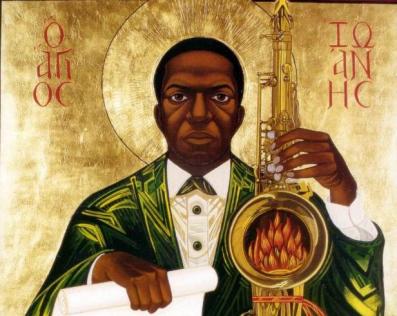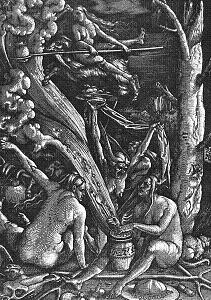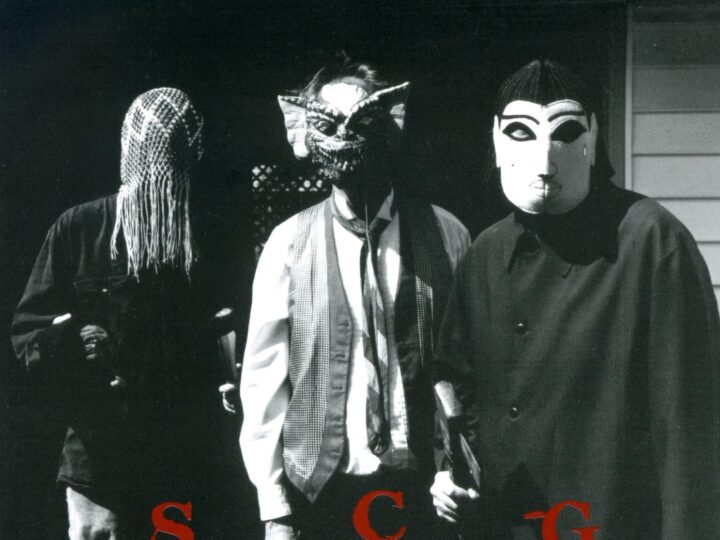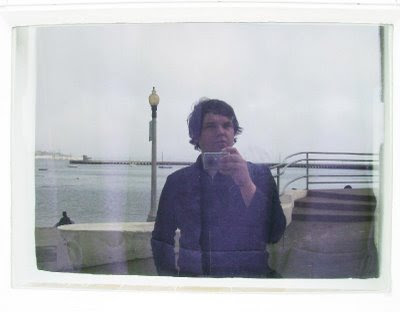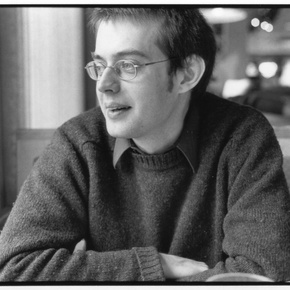
Talking with Pat Gubler about improv and cherry trees
I first time I heard PG Six’s solo album, Parlor Tricks and Porch Favorites, I had that spooky, rare, and altogether priceless sense that the artist behind the music—the singer and multi-instrumentalist Pat Gubler—had somehow tapped directly into my soul. Actually that’s not quite right—a lot of the time I’m not sure I have a soul. Maybe it’s just a neurochemical fiction, right? So it’s more like the music reminded me what having a soul feels like, at least for me, which means a beautiful but tart melancholia, a paradoxical nostalgia for some golden world I’ve never known, or at least cannot remember.
I do remember listening to Porch Songs while suffering through a late night layover in some European airport I have forgotten, hunkered down with an iPod in a crowded but silent cafe, with nothing to do but sit and wait to sit some more. I was drinking beer and staring onto asphalt and rain, and listening to this short stately tune, whose single distorted guitar melody threaded the sad and modestly majestic minor chords on the piano. I heard the almost whispered words as if they were directed to me:
When the shepherd is calling you home
Are you ready to put down the yoke
Or will you punish yourself still?
This is where I started getting sweepy. Staring at the dark haze beyond the raindrops, encased in the posthuman anomie of contemporary travel, I felt the stirrings of some deeper pilgrimage that I could not, as yet, really embark upon.
The captain is calling you to keep
Your eyes fixed on the horizon
You are all worthy travelers
Through this veil of tears.
Like its followup, the only slightly less marvelous Well of Memory, Parlor Tricks and Porch Favorites is a short album of gnostic folk, intimate and haunting and odd. Mr. Six, as the New York Times would have to call him, is not a strong singer, but a fragile one, and so you pay attention. He is a spectral finger-picker, whose guitar playing is more indebted to UK elven lords like Bert Jansch, Robin Williamson, and John Renbourn than to the Takoma primitives who loom over so many American hepcat neo-freak pickers.
On these albums, PG Six also weaves the songs together with spacey improvised passages conjured on weird old resonating instruments. Because while Gubler can do the coffee house thing, he also played for years in the strange and surprising Tower Recordings with Matt Valentine, Helen Rush, Erika Elder, Tim Barnes, etc. Tower redefined improvisation for the bastard indie children of folk and rock. On discs like Folkscene and Furniture Music For Evening Shuttles, they tapped into deep currents of collective experiment and psychedelic invocation years before that whole furry freak thing went down.
Gubler’s archaic avant-gardism shaped his third record, Music for the Sherman Box Series and Other Works, which consists mostly of chiming, ancestral explorations of odd-ball harps. Unfortunately, neither instrumental improv nor acoustica play much of a role on last year’s Slightly Sorry, his first record on Drag City. A solid rawk rekkid, the album includes an unforgettable Neil Youngish ballad (“The Dance”) and a matchless trad cover (“Lily of the West”). But the format still seemed, IMO, to clip his wings.
Before May 07 rolled around, PG Six had yet to play on the West Coast. So when he lined up a slot opening for Gary Higgins during San Francisco’s Mission Creek Festival, I was psyched. The Swedish American Hall is an atmospheric Ren Faire space, but the sound was too bright and the hall was pretty empty. (Where the fuck was everybody?) Gubler was joined on stage for a couple tunes by MC Taylor, the guitarist in the local alt-cow act Court and Spark, who had just gotten back from a wedding and was kinda drunk. Gubler played some of his best songs, and one unfamiliar one, a cover of a weird hippie tune called “Not I the Seed” he got from a Raccoon record by a guy named Jeffrey Cain. Gubler plucked and fluttered with quiet intensity, wincing at the occasional flub. I’m a moody picker too, and I just watched his fingers.
We met the next day. Gubler work a black jacket over his t shirt and thick, rectangular glasses. He was friendly and comfortable with the awkwardness of it all. He sometimes seemed tongue-tied but persevered with my queries, and his laughter was full-throated and geeky. I wish him well.
<>
ED: I didn’t read about you beforehand on the Internet, so my first questions are pretty basic. How did you first hook up with Tower Recordings?
PG6: I knew Marc Wolf, aka the Spanish Wolfman. We were at SUNY Purchase. He studied classical guitar but played a lot of rock music and experimental music. He had a few different bands with Matt Valentine, and I wound up being in this band called Memphis Luxure. That was kinda like a scrappy rock band, with a little bit Beefheart influence, a little bit Pussy Galore. You know, obnoxious. I was playing keyboards—Wurlitzer organ, and we had a Farfisa organ that we would use for a lot of the bass parts. That deep fuzzy sound.
We were living in the suburbs, Port Chester, right on the New York-Connecticut border. The drummer moved to the West Coast, we were looking for another drummer and then it sorta fizzled out. At the same time we were starting to do more acoustic jams. I moved in with Matt Valentine and his girlfriend Helen Rush, and we would have Walkmans around, just recording these mostly acoustic jams on whatever was lying around. It was really loose and liberating.
E: What was liberating about it?
P: With Memphis Luxure, we rehearsed really diligently, three times a week, workshopping all this stuff. That’s really fun too, but it gets depressing when the stuff gets cast aside because all this work went into it and now where is it? With the Tower stuff, it was really like, anything can happen. Turn on the tape, go.
E: The thing is, Tower doesn’t really sound like freeform jamming.
P: Sometimes we would improvise in a way as if pretending there were a through-composed song. Guided by Voices’ Bee Thousand was high on the listening list, and some of the Sebadoh stuff—you know, capturing these home recordings of a really embryonic version of a song.
E: Did songs sometimes emerge later?
P: One of my approaches in working on that music was going back and listening to little sections and going, This is really a strangely beautiful moment that I’d like to make peek out more. What if another instrument doubled those sets of pitches? I found that fascinating, going in and learning a little section of something and bringing that to the fore in the overdubs. It makes it more mysterious: “Is this composed? How improvised is this?”
E: Were the vocals ever improvised?
P: Absolutely. A lot of on-the-spot vocals. Not everything, though. There were some songs that were in progress and then we would record them. Record it before it gets too old! There was definitely an opinion that the first impulse was the correct one.
E: Did that resonate with you?
P: It did, especially after being in school for music. I wasn’t a hugely academic person as a musician, but I was trying my hand at theory and composition. So I might have been a little intimidated in school by people who were in the tradition of highly academic and really technical avant-garde jazz and classical music that incorporates improvisation. These people had a vast knowledge and extended techniques. I was coming at it with less time invested. It wound up being freeing for me to be able to play and to express and to not feel like, This isn’t valid cause I don’t have the chops.
E: Did a lot of that encouragement come form Matt?
P: Partially. Being around that can free you up. Just actively doing it.
E: It’s a weird kind of trust, improvising without a net. What was it like, building that kind of trust?
P: I think at its most successful, we were being free enough to let the band sound like itself. Whenever you get people together, its always going to be something different, something other than your intentions. I think we were respecting that impulse at times. At times we were trying to put a square peg in a round hole.
E: One thing that also comes through Tower Recordings and especially your stuff is a strong sense of folk tradition, which is a quality that just fascinates me. You’ll play old songs, or things that sound like old songs. That sense of drawing from tradition is part of the pleasure. Even if it’s made up, like with the Incredible String Band. But with you and Matt Valentine, and with some fellow travelers as well, there is also this commitment to improvisation, which is almost like the opposite impulse. Because then it’s not about tradition, but about what’s in the moment. Like on Pelt’s Ayahuasca, they play a twenty minute tripped-out improv drone piece, and then you get “The Coo Coo Bird.”
P: One way to be respectful of a folk tradition is to incorporate elements of it into your own music and make a point of trying to make it different and your own. Like those first wave 60s and 70s bands, amping up traditional songs—some traditional musicians probably thought it was bullshit, crass, stupid. But in some ways it’s respectful, especially in hindsight. Look at Fairport Convention. They start off playing American blues songs, and then they are like, We’re not really born into this. So then they’re mining English dance music like jigs and reels. They are seeing, It’s appropriate that we investigate this music.
E: That’s such an amazing moment, when UK musicians turn from the American folk model of the early 60s and start doing British songs. I loved that you cover the Anne Briggs song “Go Your Way” on The Well of Memory. You could have done one of the traditional songs that she was known for. But you covered one of those numbers that she wrote herself, but that sound all of a piece with the traditional material. It’s like covering this tune was a way for you to acknowledge an ancestor who also straddled tradition and her own music, who’s not just keeping it under glass.
P: If she had been born earlier, if she had been a singer and written some songs, those songs would have become “anonymous” or traditional songs. They would have made their way into the repertoire.
E: The more people study modern folk traditions, the more clear that that’s what’s happening a lot of the time anyway.
P: Its really interesting when people who are really hardcore traditional players do actually write a tune. People from the ’40s or something, they may only be known for a couple of tunes, but they make their way into the repertoire. It sounds like the original version of the tune could have started in the 1700s. But somebody tracks the history and finds out its composed by this fireman in Chicago in 1950. And somehow it makes its way.
E: The blues are a great example. When white people heard country blues in the early ’60s, they heard it as traditional anonymous music. There’s this desire to have access to some sort of culture that’s uncontaminated by modernity and the idea that there are individuals who create cultural objects, sell them on the marketplace, deserve royalties. When Robert Plant rips those guys off, he’s not going, Oh I’m gonna rip those guys off. He was thinking he was drawing from a well of collective memory.
P: Yeah, they get a bad rap for that. I don’t think they were necessarily being rip off artists or insincere. They were just short-sighted.
E: When you wrote some of the folky songs on your first two records, were there particular tunes you were spinning off of?
P: Well, I really liked that traditional song called “The Deserter,” which Fairport does, and Robin Williamson does. I wanted to play that song, but I was feeling like I couldn’t really pull it off. Some of the language is archaic, and I felt a little funny playing it. I wanted to write a song that was still in that vein, so I wrote that very short song “When I Was a Young Man.” Sometimes now I use my verses and then sing the rest of “The Deserter,” so it winds up being a fusion of my song and this traditional song. That kinda shit is interesting, to me anyway.
E: What about “Old Man on the Mountain”?
P: That’s another one where I based the melody directly on a traditional tune, this “Cherry Tree Carol” song I learned from that Shirley Collins record Folk Roots, New Roots. I just assumed it was a traditional melody. But she actually recomposed the melody for that recording. So I was like, Great! [laughs] But its an awesome melody, really beautiful.
Anyway, I wound up using that melody and I wrote this weird “Old Man” song that’s about a folkloric devil. I like the song, but it also falls short. I’ll be singing it and I’ll be like, This doesn’t have a rhyme scheme to it. Its like fake. If it was a traditional song, it would rhyme but you wouldn’t notice it rhyme.
E: What’s the original song about?
P: “The Cherry Tree Carol” is this weird creepy Christmas song, a Christian song. Its this apocryphal story that doesn’t make it into the standard scriptures.
E: What’s the story?
P: Joseph and Mary are walking along and they come to a orchard of cherry trees. And she’s like, Pick me some cherries, I’m pregnant. He freaks out. Then Jesus, who’s in her womb, commands the cherry trees to bow down so that she can pick the cherries. And there’s this wonderful line: “And Mary gathered cherries while Joseph stood around.” Wow. This poor guy. It’s like when you fuck up and you feel totally impotent. And then Joseph asks Jesus when’s his birthday. And it’s not even the 25th! He says it’s the fifth day of January. It’s such an odd song.
E: There’s a lot of apocryphal stuff in Tower and PG Six, whether it’s allusions to Philip K Dick or esoteric religious images. Your tag, PG Six, comes from a Brion Gysin book, The Last Museum. In the book PG Six trying to make his way through the bardo. That’s pretty esoteric.
PG6: The name came from Matt Valentine. He was always coming up with names. At first I was like, What? Then he gave me the book and I read it. I was like, That’s fine, that’ll be my alias. I though it was only going to be my alias for a certain kind of music. But I was just lazy so there it is.
E: Are you conscious of creating that apocryphal sentiment or does it just come out of your interests and sensibility?
P: Sometimes I’m trying to do it. The more interesting stuff just kinda happens and then you look back it. Like I find myself having a lot of pseudo-Christian references in my songs. Later I’ll just realize how all those years of going to church snuck in there.
E: A couple of your songs are about redeemer figures, or the idea of redemption. But it doesn’t sound like you’re very convinced its going to happen. A lot of Christian songs that have that image in it are sort of triumphant.
P: Yeah, like, We’re down with God!
E: But in yours I feel more like the yearning you express in the song is the redemption. Those moments don’t seem feigned or like you are just using an image from the Bible because its cool. They’re really emotional.
P: When you reference religion you are walking a tightrope. It can sound awfully fake, especially when you are doing a kind of quasi-roots music thing.
E: But for you personally, what is it that attracts you to those figures of redemption?
P: Gosh. [laughs] It’s a really good question.
E: This is a funny situation. For me there is an extraordinary poignancy to your music, a haunting quality to your guitar playing, but also to the way you sing, to what you sing about. There’s this spookiness there I find very powerful, that really speaks to me. So I have that weird, potentially false sense that I actually know you in some way. And yet all my understanding about how music works suggests that sometimes there is a clear marriage of the personality and the expression, and sometimes there’s not. I mean, I’m hanging out with you and you’re not this mystic.
P: I’m just this guy.
E: Yeah you’re just this dude. It’s funny. Those feelings are legitimate on my part—what I feel, and also what I hear. It’s deep stuff. But the way you get from you to that stuff, it can follow so many different directions.
P: Yeah. I’ve been in the same boat. Like when I’ve met artists that I’m a fan of, I used to get disappointed by that fact. You want to pick their brain because there’s something really special in their music. You are like, Can I get a little bit of that? Sometimes they can be nice and polite, and sometimes they can be assholes. I have learned not to expect that anymore, because it’s already there, it’s already in the music, that thing that you want, they’ve already put that out there. Then if you meet them and you like them, that’s a bonus, and you might actually learn something from them.
I’m thinking particular about Robin Williamson. I learned some things from him but they weren’t what I expected to learn. I took some lessons from him on the harp. It was kind of great, but it was also high pressure, cause you only have this half hour to learn something. I wanted someone to hand me the holy grail. “Ok, this is how you do it, this is how you make all this interesting music.” He was more realistic. He was interested in teaching you something really specific that you could use. So you are not going to get the holy grail of inspiration from someone. You’re gonna get someone telling you that you should learn what the good keys are for your voice and write songs in those. Something really mundane, but that actually winds up being really fucking practical advice that actually helps rather than being some esoteric thing.
E: Music is so capable of inducing that sense of idealism or devotion. Its this place where we allow ourselves to have these powerful emotions, and yet its circumscribed.
P: Like I’m playing three shows with Bert Jansch next month. If I was a little younger, I would be—and I still will be—starstruck. I’ve met him before, he’s really quiet, burned out, I mean really nice, but he’s just doing what he has to do. Certainly not a very flamboyant person. But everything is already in his music for you to learn about. It will be a pleasure to chat with him a bit, but also to give him his space, because he also probably needs to not be “Bert Jansch.”
E: Speaking of great guitarists, did you take lessons?
P: I never had lessons on guitar. I’ve done a lot of watching people. I picked up a lot of things from watching Robin Williamson. Like that open tuning I was using last night.
E: Do you use a lot of different open tunings?
P: Not so much. I used to use more. Then I got kinda burned out on the idea of having a whole bag of tricks of different tunings, and having to retune. Every once in a while I’ll put the guitar in a tuning I am not familiar with and improvise. I think that can be interesting and really great. There were a few years when I don’t think I was playing in standard tuning at all. I mean, I found myself in guitar shops, picking up a guitar and going…
E: I can’t play it any more.
P: Feeling like an idiot.
E: How about the harp?
P: A lot of my musical influences come from my older brother Steve, who is also a musician. When I was twelve he got the idea he wanted to buy a harpsichord kit. It took him like a year to put it together, and my dad and his friend Bill worked on it in the basement. It was the cheapest kit you could possibly get, so they had to solve a lot of problems. It was funny, a fun project.
That sparked Steve’s interest in esoteric instruments. He got a harp when I was in high school, so I wound up improvising on it and getting interested. Now I have two harps, a wire strung harp, and a bray harp, which is a medieval harp, with that buzzing sound. That’s a real interesting instrument. It has nineteen strings. Its tiny. You can get a lot of music out of it for such a small thing.
E: Where did you first encounter it?
P: I saw this guy William Taylor play. He’s an early music expert. I’d never heard a bray harp before. When I heard it I was just floored.
E: By what?
P: It’s the European equivalent to the sitar sound. From what I understand, it was probably the predominant sound of the harp, because you see harps in paintings by Hieronymus Bosch and stuff, and ninety percent of them have these little pins by the sound board. You turn them and they lightly touch the strings. It makes sense—you play that in a room and its audible. They liked those reedy sounds, they liked bagpipes and shawms. Things that cut through a crowd, that you could hear.
E: What’s your next project?
P: It’s still in an embryonic stage, but I kinda wanna do an instrumental, more guitar- based record. It might wind up being half guitar and half harp stuff, cause you know there’s an awful lot of guitar records out there, a lot of great ones. I’m just gonna record some pieces and see where it falls. I thought I was gonna be getting started on it by now. When the time is right…
E: Do you find it harder to get to stuff, what with work, and life, and getting older?
P: Yeah. Usually the hardest thing is just getting out of the gate, just taking the first step.
E: When you haven’t been playing, do you feel more like, Fuck man, I’m blowing it, or is it more like you’re not feeding yourself something you need?
P: A little bit both. Emotionally, it is the thing I need to do. Some people need to go to the gym or else they will feel frustrated and unhappy. I need to play. If I go away on vacation and don’t play for a few days or don’t bring an instrument, I’ll start to get tense and itchy.
E: It can be a healing release.
P: I think it’s therapeutic in every way. Even if you play for ten minutes, and you’re still angry about what that asshole did at work, there’s some benefit, because at least you didn’t just sit on the couch going, Fucking asshole! You were at least playing some music.
E: It’s not just that playing helps you get unstuck emotionally. It’s also that there are certain feelings or ways or being that you can only access when you are playing.
P: Often when I have felt like total shit, playing music has been what has gotten me through it. There’s not enough booze in the world to fill the voids you encounter in life. But sometimes you just need a little glimmer of hope, a little spiritual food or something, and you’ll probably find it by engaging your mind in something like music.
This interview appears in the jam-packed, terrific new issue of Yeti

